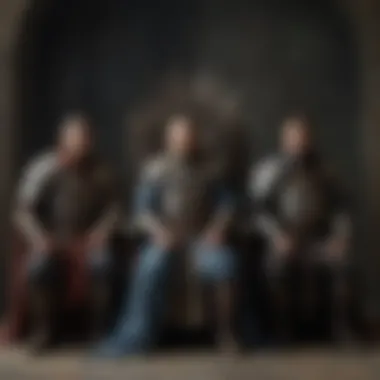Exploring Kingdoms and Lords in Game of Thrones


Intro
In the expansive realm of Westeros, the relationships between kingdoms and their lords form the backbone of intrigue, power struggles, and narratives that captivate audiences. The intricate web of allegiances, betrayals, and duties molds the dynamics of governance and society throughout the Game of Thrones universe. As one delves into the mechanics that govern these interactions, the layers of complexity reveal just how significant these ties are in shaping the fate of regions and their rulers.
The lords, while occasionally depicted as mere figures of power, carry a weight of history and responsibility. Their decisions echo through time, often rooted in a feudal system that demands loyalty and respect. The bonds between lord and vassal, as well as between kingdoms, provide a fertile ground for plots and character evolution. This exploration promises a comprehensive guide to understanding these relationships, which are not just critical for the characters involved, but also for the overarching narrative of the series.
By dissecting key players, exploring significant episodes, and delving into the lore that enriches this world, we aim to illuminate the delicate dance of power, responsibility, and consequence that permeates the series.
Character Dissections
Key Characters and their Political Maneuvering
In Game of Thrones, characters are not just pawns in a game of strategy; they are defined by their actions, ambitions, and the legacy of their houses. Each lord and lady embodies a set of values, ambitions, and heavily weighs their decisions against the backdrop of their kingdom's wellbeing.
- Ned Stark: A paragon of honor, Ned’s unwavering sense of duty brings about both respect and conflict. His commitment to the Stark family values and North’s traditions shapes the event surrounding his execution, leaving a ripple effect across the realm.
- Cersei Lannister: Possessing sharp wit and unparalleled ambition, Cersei’s transformative arc showcases the lengths one would go to secure power. Her calculated schemes against rivals offer a lesson in the volatile blend of love, betrayal, and political acumen.
- Tyrion Lannister: Often underestimated due to his stature, Tyrion’s intellect and resourcefulness set him apart. His dynamic with both family and the greater political structure underlines the complexity of being a ruler in such a tumultuous landscape.
Character Development Throughout the Series
As the series progresses, character arcs mirror the evolving political landscape while reflecting personal growth or decline. Alliances shift and loyalties are tested. Consider the stark transition of Jaime Lannister from a reviled kingslayer to a more nuanced character whose motivations are deeply examined.
Additionally, Daenerys Targaryen’s journey from a timid girl under her brother’s thumb to a fierce queen commanding dragons underscores the transformative power of circumstance and intent in shaping one’s destiny.
Impact on the Overarching Storyline
These characters contribute to a larger narrative tapestry, interwoven with themes of power, loyalty, and the consequences of one’s choices. Each decision made within the halls of power does not just affect the immediate conflict but echoes down through the years, setting the stage for future confrontations and alliances.
As we dissect these personalities and their political strategies, it becomes evident that the true strength of the series lies not just in its dramatic battles, but in the underlying currents of ambition and moral dilemmas that each character faces.
Preface to Kingdoms and Lords
The world of Game of Thrones is deeply rooted in the dynamics between its kingdoms and the lords who govern them. Understanding this relationship helps paint a clearer picture of how the political landscape of Westeros unfolds, often in unexpected ways. This exploration centers on the various elements that shape interactions among the lords while revealing the consequences of their decisions. In short, the intricate power play sets the stage for alliances, conflicts, and the rise and fall of entire kingdoms.
At its core, the title of a lord carries not just prestige but heavy responsibilities that influence their land and subjects directly. The feudal system sets boundaries and weighs heavily on relationships that can be as fragile as spun glass. Without mastering the feudal network, lords risk losing their domain altogether, as seen through various characters’ arcs. This article will delve into the idea that every decision made by a lord reverberates through the kingdom, impacting social structures and the fate of their realm.
Understanding the Feudal System
Westeros operates on a feudal system, a model rooted in loyalty and obligations. Lords hold power granted from the Crown, possessing lands and commanded by their own vassals. These dynamics necessitate a deep understanding of hierarchy, where mutual obligations dictate the relationships between those at the top and those beneath them. This layered structure is polished enough that even a slight misstep can bring repercussions that cascade across the realm.
The king’s power filters down through various tiers of lords, barons, and vassals. Each class has its own set of rights and responsibilities, creating a society where tiers alternate between support and betrayal. For instance, while a lord may bestow lands to retain loyalty, the very same gesture may sow seeds of envy, triggering conflict with other lords — often leading to bloody disputes over territory.
Historical Influences on Westeros
The historical tapestry of Westeros presents a wealth of influences shaping its kingdoms and lords. From the turbulent Targaryen dynasty characterized by familial infighting to the devastating Wars of the Roses that inspired much of the backdrop, these historical lessons resonate deeply within the universe of Game of Thrones.
Each kingdom has a distinct past that affects its present. The North's brutal winters and seasoned battles have carved a culture steeped in honor and resilience. In contrasted terms, the South might be considered more politically nimble, with the Lannisters’ penchant for gold influencing how they engage with others. This disparity highlights how the kingdoms' histories not only define their past but also dictate their interactions in the story’s unfolding.
A closer examination of historical precedents exposes the burdensome legacy each lord inherits. Decisions made by one generation echo into the next, entwining their fates in a never-ending cycle reminiscent of ancient rivalries and shifting loyalties. The past serves as both a mirror and a shadow for the lords and the lands they claim to protect.
The Structure of Power in Westeros
Understanding the structure of power in Westeros is crucial to grasping the delicate interplay between its kingdoms and lords. Each realm operates under a feudal system that shapes both political maneuverings and personal relationships. From the distant North to the sun-drenched South, the balance of power affects not only the lords but also their subjects, creating a complex web of loyalties, fears, and ambitions.
Hierarchy Among Lords


In Westeros, the hierarchy among lords is not simply a matter of noble titles; it’s a carefully constructed system that dictates who commands authority and who follows. At the top sits the King, the ultimate authority tasked with maintaining order across the Seven Kingdoms. Below him are the great houses, each lord presiding over vast territories alongside their bannermen. The Stark of Winterfell, the Lannister of Casterly Rock, and the Baratheon of Storm's End exemplify how power trickles down through bloodlines and martial prowess.
The relationships between these lords are fraught with tension and opportunity. One misstep can lead to the rise of new allegiances or the fall of old ones. Consider the Starks and their firm adherence to honor. This virtue often places them at odds with the more cunning Lannisters, who leverage wealth and deception to maintain their supremacy. Such dynamics reveal the fragility of power: it can easily shift, much like sand beneath a foot.
Furthermore, the land’s value plays a significant role in determining a lord's status. Larger territories or strategically positioned castles command more respect, yet they also attract unwanted attention. The more a lord has, the more he risks losing. Therefore, the hierarchy is as much about strength as it is about stability. Lords must navigate their responsibilities with care, as the pecking order can change overnight, especially in times of unrest.
The Role of the Crown
The crown represents not just the highest seat of power but the weight of tradition and expectation that comes with it. The role of the crown in Westeros is a double-edged sword. It brings prestige and authority but demands uncompromising loyalty and constant vigilance against betrayal. The Iron Throne, symbolic of this power, stands as a reminder of the fierce competition that characterizes rulership in the realm.
Authority and Decision-Making: The king’s decisions can make or break houses. A king who seeks to solidify his rule may manipulate alliances, granting titles to loyal houses or punishing those who oppose him. Such actions underscore the crown's role as both a unifier and a divider within the realm. For example, King Robert Baratheon garnered support through personal friendships, yet his reign was marred by unwise choices that bred resentment among the lords.
The presence of the crown also leads to the question of legitimacy. A king must prove his right to rule, either through bloodline or conquest. This continual need for validation shapes the politics of Westeros; every move is scrutinized under the lens of who gives the orders and who follows them. Disagreement can be ruinous, leading to challenges that threaten the very fabric of the kingdom.
To sum up, the structure of power in Westeros is intricate, defined by a fragile balance where hierarchy and royal authority entwine. The dynamics among lords present a constant tug-of-war, a game of strategy where one wrong move could plunge a house into chaos or elevate it to unprecedented glory. Through it all, every character claims their role in this ongoing saga, one built on blood, loyalty, and ambition.
Kingdoms of Westeros
The kingdoms within Westeros provide a crucial backdrop to the intricate political and social dynamics of Game of Thrones. Spanning a diversity of regions, each kingdom holds its own unique characteristics, traditions, and challenges. The overarching importance of understanding these realms lies in the fact that they set the stage for power plays and alliances that dictate the fate of not only individuals but entire families and communities. The distinct cultures, values, and conflicts interwoven throughout these territories reveal much about the broader themes of loyalty, ambition, and the quest for power.
The North: Stark Leadership
The North, a rugged and formidable expanse dominated by harsh winters and vast wilderness, is home to House Stark, famed for their honor and resilience. The Stark leadership exemplifies a deep-seated commitment to justice and loyalty, which stands in stark contrast to the often treacherous politics of Westeros. Ned Stark's motto—"The man who passes the sentence should swing the sword"—encapsulates the essence of Stark leadership, grounded in personal accountability and moral integrity. This steadfastness resonates throughout the North, making it a bastion of loyalty. However, the North’s isolation and honor-bound principles can also become their Achilles' heel, as harsher, more cunning factions seek to exploit their virtues for personal gain. The Stark's bond with their ancestral home, Winterfell, further reinforces their role as protectors of the North, illustrating the connection between land and leadership.
The South: The Lannisters' Ambitions
Meanwhile, in the southern kingdoms, House Lannister personifies ambition and strategic cunning. Their wealth and powerful influence afford them a distinct advantage in the political realm, allowing them to manipulate situations to their favor. Cunning and ruthlessness often characterize their approach to governance, with Tywin Lannister leading through a combination of fear and respect. The famous phrase, "A Lannister always pays his debts," becomes both a warning and an assurance, underscoring their capability to exact revenge or reward. The Lannisters' quest for power typically manifests through strategic alliances, calculated betrayals, and a relentless focus on securing their bloodline's continuation through means such as marriage. This thirst for power positions them as formidable players in the game of thrones, elevating their status but also incurring the wrath of others.
The Riverlands: A Tapestry of Loyalties
The Riverlands, situated at the crossroads of Westeros, weave a complex tapestry of allegiances and conflicts among multiple houses. With its fertile lands and numerous waterways, the Riverlands are economically vital, attracting various lords eager to gain control. Houses such as the Tullys, Freys, and Blackwoods reflect the region’s multifaceted loyalties, leading to shifting allegiances during conflicts. The strategic significance of the Riverlands is emphasized during the War of the Five Kings, as control over this region directly impacts supply lines and troop movements. The intricate politics here often lead to unexpected consequences, demonstrating how local disputes can reverberate throughout the entirety of Westeros. This emphasizes that every kingdom, regardless of size, plays a role in the broader dynamics of power.
Each kingdom's uniqueness contributes to the rich narrative tapestry of Game of Thrones, revealing how personal ambitions, cultural values, and territorial sovereignty intertwine.
Through examining the diverse realms of Westeros, from the honorable North to the ambitious South and the tangled loyalties of the Riverlands, readers gain a deeper understanding of how various dynamics shape the lives of the characters and influence the overarching plot of the series.
The Responsibilities of Lords
When we think about the lords in Westeros, it's easy to get lost in the pageantry and the power struggles. But beneath that grand facade lies a heavy weight of responsibilities that these figures must shoulder. Their roles are not only about feudal allegiance to the Crown but also about maintaining order and prosperity in their realms. A lord serves as an essential pivot for the well-being of his vassals, the managing force that can uplift the spirits of the smallfolk, or plunge them into despair.
Lords can be seen as the linchpin of the feudal system, responsible for various aspects of governance that directly impact their subjects. This duty encompasses the management of land and economy as well as administering justice and maintaining order. Fulfilling these responsibilities ensures stability within their houses and, by extension, the kingdom itself. In a world where rivalries and conflicts are the order of the day, a good lord sees the need to balance the scales of power, navigating the treacherous waters of political dynamics.
Land Management and Economy
Managing land is more than just a matter of ownership; it reflects the vitality of an entire kingdom. Lords are tasked with overseeing the resources that lie within their dominions, from agricultural outputs to taxes collected. While the lords themselves may not toil in the fields, their effectiveness in land management can mean the difference between thriving towns and starving peasants. Consider the Stark family in the North, for example. Their stewardship of Winterfell includes not only sustenance for their household but also provisions for their bannermen and commoners who look to them in times of want.
The economy is closely linked to this land management. A prosperous economy means not only wealth but also loyalty and stability. Lords need to ensure that trade routes are safeguarded and that towns within their lands flourish. Otherwise, discontent can brew among the populace. As history teaches us, famines or heavy taxes can spark revolts, and it's often the lords who bear the brunt of those consequences.
- Key Considerations in Land Management:
- Understanding climatic conditions
- Investing in infrastructure
- Maintaining strong trade relations
Justice and Order


In the often lawless lands of Westeros, the lord's role as a provider of justice cannot be understated. Maintaining order is an obligation stemming from their position, extending fairness to all subjects, from the noble to the peasant. A lord must act as the judge and jury, capable of mediating disputes and ensuring that laws are respected. This can be a precarious balancing act, especially when dealing with the powerful families that might contest their authority.
In moments of unrest, swift and decisive actions can quell chaos before it spreads like wildfire. A lord who neglects justice invites chaos. Without it, loyalty wanes and rebellion simmers just beneath the surface. When a lord exhibits fairness, manages disputes wisely, and ensures the welfare of the community, he secures a lasting alliance with his vassals.
“Justice will not be served until those who are unaffected are as outraged as those who are.”
Understanding the weight of their judicial responsibilities ensures that lords wear their titles with more than just pride; it becomes pivotal to their legacy. The course of history in Westeros has much to do with the way its lords manage land and dispel justice. These aspects intertwine, creating the very fabric of loyalty, trust, and ultimately, stability in a realm rife with challenges.
Conflicts and Alliances
The realm of Westeros is a tapestry woven with threads of conflict and alliances. These elements are not merely side features; they're the lifeblood of the power struggles in the Game of Thrones saga. The dance between different factions and houses forms the backbone of political maneuvering and ultimately shapes the course of events in the story. Understanding this dynamic is crucial for grasping the underlying motivations and strategies of various lords and kingdoms throughout the series.
"In Westeros, no one is truly safe, and alliances are as fragile as the ice in winter."
The Constant Power Struggle
Power in Westeros is in constant flux, resembling a river that may change its course without warning. The stark divide between rival houses fuels a relentless quest for dominance. Every lord aims to consolidate their power while constantly keeping a wary eye on their rivals. The Starks, for instance, value honor but do not shy away from using strategic tactics when survival is at stake. On the other side, the Lannisters see power as something to be seized at all costs, employing gold and cunning to maintain their advantage.
Coupled with their ambitions are the uncertainties spurred by lingering rivalries. The tug-of-war for the Iron Throne has resulted in numerous betrayals and shifting loyalties. Take the War of the Five Kings as an example—it illustrates how quickly alliances are formed and dissolved, often based on momentary political advantages rather than enduring principles. The intense pursuit of power leads to frequent skirmishes and outright warfare, showcasing a raw ambition that affects the very existence of various houses.
Strategic Marriages and Alliances
In a world where strength often lies in numbers, strategic marriages are a common tool among lords and ladies. The union between the various houses serves multiple purposes: solidifying power, securing peace, or even exerting control over hostile regions. To marry within or outside their kingdoms is an art form, one that often results in a balance of power, for better or worse.
- The Targaryens often wed cousins and siblings to keep their bloodline pure, which showcases a particular focus on lineage, but it also made them vulnerable to civil strife.
- The Lannisters strategically align with the Baratheons through marriage to solidify their hold on the throne.
Such alliances often come with complicated strings attached. While marriages can signal a cessation of hostilities—even creating a superficial peace—they are not guarantees. The infamous Red Wedding is a chilling reminder of how fragile these agreements can be. The once-celebrated union of the Starks and Freys ended in a massacre, revealing the dangerous game being played in the world of Game of Thrones.
Through these marriages and family ties, lords can gain access to resources, land, and military support that they might not possess otherwise. However, the trade-off is often a question of loyalty, as the new dynamics can create rifts within families or between allies. The intricacies of these arrangements highlight the complexities of relationships in Westeros, where every alliance may be more than it seems.
In essence, conflicts and alliances in Game of Thrones serve as reflections of human nature itself: ambitious, unpredictable, and often treacherous. Understanding these dynamics is crucial for anyone keen on unraveling the deep political undercurrents that shape the destinies of kingdoms and the fate of their lords.
Character Analysis: Notable Lords
In the complex world of Game of Thrones, the lords are not mere titles; they embody power, ambition, and the shifting landscape of loyalty and ethics that defines Westeros. Analyzing notable lords like Ned Stark, Tywin Lannister, and Stannis Baratheon reveals how individual characters influence the fate of their respective kingdoms. Each lord represents a distinct philosophy of leadership, illustrating the range of responses to the daunting challenges of rule and the consequences of their decisions. Not only does this analysis highlight the characters' motivations and methods, but it also sheds light on how their actions ripple through the larger narrative, affecting alliances and igniting conflicts.
This section structures its exploration of these pivotal figures by delving into their virtues and flaws, the ramifications of their choices, and what these characteristics reflect about the nature of power in a feudal society. Understanding these key lords allows fans to appreciate the rich layers of storytelling that make Game of Thrones compelling.
Ned Stark: Honor and Leadership
Ned Stark, the head of House Stark, is often hailed as the epitome of honor and integrity in a realm rife with treachery. His commitment to ethics shapes not just his character but the dynamics of relationships within the North and beyond. Ned’s unwavering belief in duty often clashes with the harsh realities of a politically charged environment, leading to consequences that resonate throughout the series.
His leadership style is characterized by a strong moral compass, placing emphasis on loyalty and family, which can be seen through his actions concerning family members and bannermen. Ned's famous line, "The man who passes the sentence should swing the sword," elucidates his stance that one must take responsibility for their decisions. However, this idealism can also be a double-edged sword. His inability to navigate the murky waters of political intrigue ultimately leads to tragic outcomes.
- Elements of Leadership:
- Strong Morals
- Family Loyalty
- Responsibility for Justice
Ned Stark serves as a reminder that while honor is noble, it can sometimes come at a significant personal cost. His downfall underscores an essential theme: the peril of idealism in a corrupt world.
Tywin Lannister: Ruthless Ambition
In stark contrast to Ned Stark stands Tywin Lannister, the patriarch of House Lannister. Tywin is the embodiment of ruthless ambition, often viewed as a cold strategist whose primary focus is power consolidation. His approach to leadership is calculated and unwavering, marked by shrewd manipulation and a profound understanding of human nature.


Tywin’s methods are often ruthless, displaying a willingness to do whatever it takes to retain influence. His famous quip, "A lion does not concern himself with the opinion of sheep," encapsulates his detached approach to power. He believes that strength, rather than honor, ensures survival in the brutal realm of Westeros.
- Key Principles of Tywin's Leadership:
- Strategic Manipulation
- Total Control
- Unyielding Authority
What makes Tywin particularly fascinating is his paradoxical relationship with his family. Despite his desire for power, his ruthless methods often strain these ties, showcasing how ambition can erode familial bonds. His character is a testament to the dark side of ambition and the often-destructive nature of the quest for power.
Stannis Baratheon: Claim to the Throne
Stannis Baratheon’s character is a complex amalgamation of rigidity and determination. His relentless claim to the Iron Throne is woven through a profound sense of justice and a fierce belief in his right to rule, stemming from his bloodline as the rightful heir. Stannis’s devotion to duty supersedes personal attachments, making him a unique player in the Game of Thrones.
Unlike other lords who may be swayed by emotion, Stannis's decision-making process heavily relies on a strict interpretation of right and wrong. His famous mantra, "The Law is the Law," highlights his belief in adherence to the rules, even when it may lead to unpopular choices.
- Notable Aspects of Stannis’s Character:
- Unwavering Sense of Justice
- Intense Duty
- Polarizing Leadership Style
However, Stannis’s fixation on his claim can border on obsession, leading to significant ethical dilemmas, including the controversial association with Melisandre and her dark magic. His story arc raises questions about the cost of ambition and the impact of choices made in the name of duty on the lives of others, providing a sobering commentary on the personal sacrifices inherent in the pursuit of power.
The Fall of Kingdoms
The fall of kingdoms within the engaging world of Game of Thrones serves as a pivotal element in understanding the complex dynamics of power and rulership. Each decline sheds light on the fragility of authority, illustrating that the greater the power, the heavier the burden. Exploring the reasons behind these declines provides readers with a comprehensive view of how alliances, betrayals, and leadership qualities can significantly shape the political landscape of Westeros. It becomes apparent that the rise and downfall of kingdoms is not merely the result of battle; it is often rooted deeply in the decisions of its leaders, the loyalties of its people, and the ever-changing tides of circumstance.
Causes of Kingdom Decline
Multiple causes can lead to the decline of a kingdom in Westeros, revealing the complex interplay between personal ambition, external threats, and societal issues. These factors range from internal strife to the sheer unpredictability of power struggles:
- Poor Leadership: When kings and lords make decisions driven by greed or misplaced trust, they often doom themselves. Take Robb Stark, for instance, whose decisions during the War of the Five Kings were marred by youthful pride and emotional decisions. Fatal choices stirred discontent and ultimately weakened his claim to power.
- Weak Alliances: The importance of alliances in sustaining power cannot be overstated. A kingdom stands on the pillars of reliable partnerships. Renly Baratheon’s political maneuvers illustrate this well. His failure to secure and maintain strong alliances ultimately led to his demise, demonstrating that even a charismatic leader cannot stand alone.
- Economic Strain: The cost of maintaining a kingdom is exorbitant. Throughout Game of Thrones, we see kingdoms crippled by poor resources or a lack of trade — an example being King’s Landing during the reign of Joffrey Baratheon. Unwise spending and mismanagement resulted in civil unrest, feeding a cycle of rebellion.
- War and Conflict: Constant warfare leads to depletion of resources, loss of life, and ultimately, the breakdown of social order. The Targaryens’ downfalls, especially towards the end of their reign, show how internal conflict can awaken the ambitions of the oppressed and spark a full rebellion.
- Cultural Conflicts: The differences in culture between the North and South create deeper ties of conflict than simply political differences. These rifts grow when leaders fail to appreciate or respect the various customs of their subjects.
Each point mentioned illustrates that the reasons behind a kingdom's fall are often multifaceted and interconnected, making it vital for lords and kings to navigate these complex waters with prudence.
Lessons from the Past
Reflections on the declines of various kingdoms throughout Game of Thrones provide essential lessons that resonate beyond the pages of the series. Such insights can elucidate key strategies for both fictional and real-world leaders alike:
- Adaptability: The ability to adapt strategies in the face of changing conditions is a crucial skill for any ruler. The threat from Daenerys Targaryen serves as a sobering reminder of how stagnant approaches can lead to downfall.
- Value of Knowledge: Understanding one's surroundings–politically and economically–is indispensable. Characters like Olenna Tyrell employed keen insight to fortify her family's position, often staying one step ahead of her rivals.
- The Personal is Political: Decisions that seem personal intertwine with political ramifications. Leaders, such as Eddard Stark, faced dire consequences because of their honor-driven, but politically naïve, choices, teaching the lesson that sometimes, the price of integrity can be too high.
- Unity in Diversity: Acknowledging various factions within a kingdom can be beneficial. The downfall of House Lannister faced significant challenges primarily due to their neglect and exploitation of other houses and regions.
"Power resides where men believe it resides. It’s a trick, a shadow on the wall. And a very big trick."
— Varys
Learning from the experiences of fallen lords and ladies, we grasp that a ruler's fate intertwines closely with their ability to connect, compromise, and adapt. The dynamic realm of power in Game of Thrones offers not only a gripping tale but also a roadmap for understanding the governance and leadership challenges that persist through time.
Culmination: The Enduring Legacy of Kingdoms and Lords
The interplay between kingdoms and lords within the vast world of Game of Thrones serves as a microcosm of power, loyalty, and ambition, echoing throughout the series and leaving an impression that resonates beyond its final episode. At the heart of this saga lies a simple yet profound theme: the responsibilities that come with power. The story weaves a rich tapestry, where every thread—the alliances, betrayals, and sacrifices—contributes to the enduring legacy that these realms and rulers harbor.
Impact on Current and Future Narratives
The implications of the reigns of Stark, Lannister, and other noble houses have set a precedent that still captivates viewers and inspires discussions around contemporary governance and power structures. For instance, the intricate relationship dynamics between rulers and their subjects showcase the human condition—where ambition often overshadows honor, and the cries for justice sometimes fall into deaf ears. This is more than a fantasy tale; it's a reflection that offers insights into modern political scenarios.
The future narratives in such worlds can learn from the historical context provided by these lords. Here are several elements to consider:
- The Role of Leadership: The series highlights that a leader is often judged by how they balance power with morality. As characters evolve or devolve depending on their choices, we see the weight of decisions that shape entire kingdoms.
- Alliances and Loyalties: The necessity of forming strategic alliances, just as alliances were forged and broken in Westeros, remains relevant in current political landscapes. The survival of a kingdom often hinges on who sits around the table, a reflection that echoes in international diplomacy today.
- Lessons in Governance: From the rise of rising kingdoms to their abrupt falls, each plot point is a lesson in governance. Tyranny and rebellion often emerge from the same roots, teaching future generations the importance of maintaining the trust of the governed.
"Those who do not learn from history are doomed to repeat it." - An echo of the wisdom imbued in the saga.
In essence, the story’s portrayal of kingdoms and their lords provides rich material for readers and scholars alike to unpack. The threads woven into the narrative not only entertain but also educate, compelling us to reflect critically on the systems we see populating our own societies. Just like in Westeros, where the past continuously shapes the present, so too will the actions taken by leaders today echo in the stories of tomorrow.



